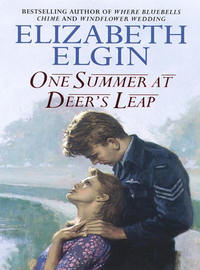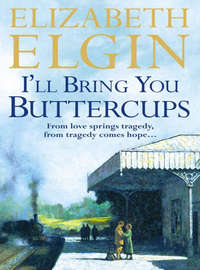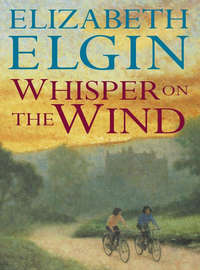
Полная версия
The Linden Walk
‘I think so. Thank you, darling.’
He bent down to kiss her. Later, when Mary was asleep and they had eaten supper, would be the best time to talk.
‘Sweetheart,’ he whispered. ‘There’s something I’ve got to tell you. I’m not supposed to, but I don’t care.’
‘About the war, Keth – your war?’
‘Yes. But you half knew, didn’t you, that I didn’t spend all the war code breaking.’
‘Sort of. France came into it, and someone called Natasha. That much you admitted to, and then you clammed up.’
‘I had to. I’m still bound by the Official Secrets Act. For thirty years, I was told. But let’s see Mary off to bed and have our supper. Then I’ll tell you.’
‘You don’t have to, Keth, though I would like to know; clear things up, kind of. And Mary’s finished, now. Can you get her wind up for me, then I’ll make a start on the meal.’
Keth held out his arms for his daughter, loving the milky, baby-soap smell of her, loving her so much it made him afraid.
‘The new car, darling.’ He kissed the nape of Daisy’s neck as she bent over the cooker. ‘I still can’t believe it. How do I begin to say thank you?’
‘By winding Mary and getting her to sleep for me.’ She turned, kissing him provocatively. ‘And that’s just for starters.’
‘I love you,’ he said softly. ‘But I don’t have to tell you that, do I?’
‘Yes, you do. Every day. There’ll be trouble if you ever stop. Now get from under my feet, Keth Purvis. I’m busy!’
‘You sound just like your mother,’ he laughed, then laid his daughter over his shoulder so she could snuggle her little soft face into his neck. Then he began a heel and toe rocking movement. It always got her to sleep. He laid a hand protectively over the back of her head, wondering how any woman could find the strength to give away her child.
‘I’m adopted. I don’t know anything about my mother, except that she wasn’t married and couldn’t keep me. I only know that I was born in Paris and that she was called Natasha. That’s why I took it as my codename,’ Hannah-Elise had told him.
Give his little girl to another woman then turn, and leave her? Give Mary away, never knowing that before she reached womanhood she would die, be killed?
‘I think she’s asleep,’ Keth whispered chokily.
‘Then take her up, will you? The cot’s ready. Careful, now.’
Daisy switched on the hall and landing lights, watching her husband carry their child to bed, thinking how lucky she was; always had been. And how grateful she was to be so loved.
SEVEN
‘That’s it, then.’ Tom Dwerryhouse unfastened his brown leather leggings, then eased off his boots. ‘No more shoots till the New Year. Can’t say I’m sorry. It’s hard work, organizing those syndicates. Most of the guns haven’t got a dog with them, and wouldn’t dream of using a loader. Not like shoots used to be, Alice. And before you say it,’ he hastened, ‘I know that leasing out the shooting keeps me in a job, but some of that lot need an eye keeping on them. Think they’re still in the war, and taking pot shots at anything that moves.’ He held his hands to the fire, then gazed at the table top and the paraphernalia of dressmaking spread there, instead of a white cloth and cutlery. ‘Supper a bit late, is it?’
‘Unless you’ve lost your sense of smell, only by ten minutes. It’s all in the oven, ready to dish up. Pheasant casserole. By the time you’ve washed your hands I’ll have cleared this lot away. Told you, if you think back, that I didn’t want to be last-minute with my dress for the wedding, and I was right. Wedding brought forward, now, to April.’
‘Aye, lass, but that’s still near on five months away.’
‘I know that. And I’m glad I didn’t buy anything flimsy, with June in mind. Must have known to buy something a bit more substantial. April can be cold, sometimes. Can’t go far wrong with a nice bit of fine wool, though heaven knows why I chose this colour – apart from it going nicely with my hat, of course.’
‘I like it. You’ll look bonny in it. What colour would you call it, Alice?’
‘Apricot, and it’ll never be out of the dry-cleaners, if you want my opinion.’ Carefully she gathered swathes of material and the pieces of paper pattern pinned to them. ‘But never mind. April is the best month for weddings. Our Daisy’s was perfect. So get out of your best suit and put something comfortable on. Five minutes, and supper’ll be on the table.’
Pheasant, with carrots and baby onions and jacket-baked potatoes. Casseroling was all she could do with the old bird Tom had brought home yesterday but welcome for all that, when meat was as hard to come by as it had been in the war.
But the war was over, and Daisy and Keth and Drew safely back from it; Lyndis, an’ all, thanks be. She heard Tom walking overhead and the creaking of the wardrobe door. Nasty old month, November, but Keeper’s Cottage was snug and warm, and there was a good play on the wireless tonight. And with a little new Sutton due and Tatty getting wed next month, and Christmas to follow, it wasn’t a bad old world, Alice was bound to admit. Better by far than the day Daisy had left for Dunfermline to be a Wren, and the war looking like it would go on forever.
Yet it had been over these three years gone and herself a gran, and Daisy living hardly a cock-stride away. Aye, and Keth with a new car and half of Holdenby green with envy.
‘Aaaah.’ She billowed out the tablecloth then let it fall to a sigh of contentment, smiling at her husband more comfortable now in corduroy trousers that had seen better days, and the sweater she knitted for his last birthday. His fifty-seventh and him as good to look at, still, as the day she’d first met him in Brattocks Wood.
‘So what have you been doing with yourself this afternoon?’ Tom sat in the fireside rocker, filling his pipe then laying it aside in the hearth to be smoked when supper was cleared away and Alice sitting opposite him, knitting.
‘Doing? Well, apart from laying out the pattern, I’ve been to the Bothy. Polly was there, and asked me in for a look round. You’d hardly know the place, Tom. That little room you slept in has a carpet on the floor that stretches from wall to wall, and very posh curtains. All from Pendenys, of course. I reckon Julia will be doing a forage in Rowangarth attics before so very much longer. Nothing ever thrown away, there. Lady Helen used to say, “Keep a thing for seven years, and you’ll find a use for it.” Shouldn’t wonder if Julia doesn’t find most of what she needs up there to furnish the Bothy. Remember when you slept there, Tom, with the garden apprentices and the stable lads?’
‘Aye, and ruled with a rod of iron by Jinny Dobb …’
‘Who did Rowangarth’s washing, an’ all, and told fortunes. Then the Great War came, and there was no one there to be looked after; all gone to fight. Then we left Hampshire, came home again to Rowangarth. Left Dickon behind in the churchyard, and Beth and Morgan in Beck Lane with a stone over them so people would know, and not disturb them …’
‘And Polly and Keth came with us, too, and Polly took over at the Bothy, grateful for a job and a roof.’ Tom stared into the fire. ‘And her glad when the government commandeered it and put land girls in there for her to cook for, when another war came. Memories, Alice. Good ones and bad ones. But it worked itself out in the end, and if you don’t mind, love, I’m ready for my supper.’
‘Was there ever a time, Tom Dwerryhouse, when you weren’t? And shift your feet so I can get at the oven!’
So he smiled and got out of her way, and if she hadn’t had a very hot dish in her hands, he’d have pinched her bottom as she bent over. A very nice bottom, come to think of it, for a grandmother who would not see fifty again!
Lyn had been sure all day that a letter from Kenya would be there when she got home from work. And it was.
She put a match to the fire, changed her wet shoes for slippers, then carefully slit open the envelope.
Hullo, lovely girl!
This is a quick one to tell you that your dad has got us a passage home, and we should dock in England a week before Christmas. We have a cabin on a cargo ship from Mombasa to Cape Town where we embark on the Stirling Castle – newly refitted after being a troopship in the war.
I’m a bit nervous about flying, so your dad said it was no problem. By sea was much nicer, even though it’s going to take a lot longer.
Will give you all details – sailing times, cabin numbers, etc, as soon as we have them confirmed. Now that I know we are almost on our way, I can’t wait to see my girl again. And I’ll remember to pack warm clothes. I haven’t been so long gone that I have forgotten how cold it can be in Wales, in winter.
Will write again, soon.
With love,
Mam X X (and Dad)
Home! Her mother – her darling Auntie Blod – was coming home for Christmas! Only then did Lyn realize how much she had missed her, needed her. Eighteen months since she had seen her; eighteen years, near as dammit, since she saw her father.
Christmas, and them together in the little cottage in Wales – or would they be asked to Rowangarth? And how long would they be staying, once they knew that the wedding had been put forward to April? She wouldn’t care if they never went back. They would, of course, but just for a while she would be part of a family, with her father walking her down the aisle.
Her father, Jack Carmichael, was little changed it would seem, from when she last saw him. Still straight-backed and slim; still the thick, dark hair with hardly a streak of grey in it. Handsome, even yet. No wonder Auntie Blod had fallen in love with him and stayed in love with him.
All at once Lyn felt a strange contentment, because she wasn’t alone; stupid of her ever to have thought she was. Soon, she would have her mother to confide in, to tell of the uncertainties she still sometimes felt. And her mother would understand because she knew, didn’t she, what it was like to love a man, to lose him and then, in the end, to marry him.
‘There’s stupid, our Lyndis. Worrying about your wedding night, are you? Then get yourself into bed with him, girl. Try before you buy, why don’t you? I did!’ Lyn could almost hear the words.
‘Yes, and look where it got you. It got you pregnant with me,’ Lyn smiled to the face in the mirror over the mantelpiece.
All at once she was hungry. Nothing like good news to give you an appetite. She would boil the brown egg Daisy’s mother had given her and slice into the loaf Daisy’s mother had baked, then spread it thickly with bramble jelly. Sheer bliss. Eating home-made bread and jam was almost as good as being in love, especially when you were getting married in April. The second Saturday in April. It had a firm ring to it. Daisy had been married in April.
‘I always associate my wedding with windflowers,’ she once said. ‘The little white, wild anemones. They were flowering in Brattocks Wood.’
And she had added, pink-cheeked, that she associated their honeymoon with bluebells because they had gone back to the place she and Keth grew up in, made a sentimental journey to Beck Lane in Hampshire, where the woods were thick with bluebells. And they had been lovers there. Lucky Daisy and Keth who had wanted no other. They were still at school when they realized they were in love. No complications for those two; no doubts.
The fire had begun to blaze and crackle. Outside, the night was dark, but this snug, thick-walled little house with curtains pulled across the windows and lamps burning softly, was a good place to be. If she couldn’t be in the winter parlour at Rowangarth with Drew, that was. And the two of them making plans in the fireglow or even – crazy thought – making love?
But no, not now. She had lived these many years a reluctant virgin and would stay so until her wedding night. And instead of thinking about wedding nights she thought about a boiled fresh egg, and bread and jam and Drew, who loved her, even though he had never said so. Never actually said the words.
‘I love you, Drew Sutton,’ she whispered to the brown egg she lowered carefully into the pan. ‘I always will …’
‘So it’s to be an April wedding?’ Mary Stubbs sniffed. ‘Why the change of plan? I’d have liked June much better.’
‘Aye, but it’s not for you to say, is it, since it’s not you going to wed Sir Andrew.’
‘Don’t talk so daft! I’m well suited with the man I’ve got, thanks all the same.’
Well suited with Will Stubbs, once stable lad at Rowangarth, then promoted to groom and, since motors had replaced horses, now as apt a motor mechanic as any in these parts. Because Will had been astute; had learned about motors and their innards in the Great War, because horses, he had decided, would be on their way out once that war was over with. And he was right! He was very often right, Mary Stubbs was bound to admit; was what people might call a self-educated man though Tilda, in a fit of rage, had once called him a right know-all; she at the time being on the shelf with little hope of ever getting off it, and prickly about those who had.
Then the government had commandeered Pendenys Place and the Place Suttons thrown out of it and Sergeant Sidney Willis, together with a battalion of Green Howards, came to guard it. Very lucky Tilda had been, meeting her Sidney.
‘We’ll be invited to the wedding,’ said Tilda, seeing the need to change the subject. ‘And no problem with what to wear. You and me both have wedding outfits and decent hats.’
‘So we have, but I’m going to have to ask Alice Dwerryhouse to let mine out – just a little …’
‘Middle-age spread, Mary?’
‘No, Tilda dear. Just contentment and the love of a good man. And I’ll be off to look in on Miss Clitherow, make up her fire, then see if there’s anything Miss Julia or the Reverend wants when I’m in Creesby, this afternoon.’
‘You could call in on that grocer of ours, ask him if he’s got anything under the counter. That man is too smug for his own liking, ladies always flattering him for handouts. That one needs to be reminded that food won’t always be rationed and that in the old days, Rowangarth was one of his best customers!’ Tilda longed for the day when, telephone to her ear, she gave her order to the grocer and the butcher and what was more, had them delivered! ‘But everything comes to she who waits,’ she nodded with a narrowing of her eyes and a rounding of her mouth. ‘Oh my word, yes!’
‘Then I think you’ll be in for a long wait, Tilda. What with that lot in London rationing bread and everyone on waiting lists, still, for the necessities of life!’ (Mary Stubbs longed for a refrigerator.) ‘And with the Royal Air Force dropping food that by rights should be ours for those Germans in Berlin, I don’t know what the world is coming to. Our lot did win the war, Tilda? Correct me if I’m wrong!’
‘We won it.’ Tilda smiled. ‘I think it’s just peace that we can’t get used to.’ Wars weren’t all that bad; not when they had landed a battalion of Green Howards on her doorstep. ‘And will you tell Miss Julia that I got a jar of coffee powder the other day, and would she and the Reverend like to try it for elevenses?’
‘Powdered coffee,’ Mary gasped. Whatever was the world coming to!
Olga, Countess Petrovska sat beside the fire in the small, ground-floor room at the back of the house in Cheyne Walk. She did not like sitting in what had once – in another fairytale life it sometimes seemed – been the housekeeper’s room. But now they had no housekeeper, no servants and anyway the small room was more easily heated. She closed her eyes and drifted back to the house beside the River Neva where fires warmed all the rooms, and servants enough to keep them constantly burning.
It would be bitterly cold, now, in St Petersburg. The river beside which she once lived would have started to freeze, but she would have been making plans for Christmas, which lasted well into January, with parties and balls and friends calling each afternoon to gossip about who was with whom at the ballet, last night, and who would get himself talked about if he were foolish enough to have more than two dances with the Sudzhenska girl. Talked about, or compromised into an engagement if he wasn’t careful and thought less about her father’s wealth and more about her sullen, spotty face!
‘Mama. You were daydreaming again!’ Igor’s clicking fingers demanded attention.
‘Yes. I was in my salon with my friends, drinking tea from china cups.’
‘And putting St Petersburg society to rights!’
‘Tittle-tattle. Gossiping about anything and nothing, my only worry to find wives for my sons and thinking about whom my daughter might marry in two, three years’ time …’
‘When you ought to be thinking about your granddaughter’s wedding!’
‘Tatiana has a mother to worry about her; a mother who right from the start was determined to do exactly as she pleased. First she insisted upon marrying Elliot Sutton, then she went to work – a Petrovska, working! And now she has chosen to marry a doctor and become one of the middle classes!’
‘Mama! My sister was young and foolish and you did nothing to stop her marrying Sutton.’
‘He was wealthy …’
‘He was a brute! He wanted only to breed from her!’
‘Igor! Watch your tongue when you speak to your mother! I will not have such coarseness in my home! But you are right, I suppose,’ she shrugged. ‘He wanted a son. His mother demanded a son. Such a loud woman, that Mrs Clementina, but breeding will out!’
‘Shall we talk about Tatiana?’ he said softly, coaxingly.
‘Who is to marry a man with no background.’
‘A man who cares deeply for her, Mama. And don’t forget you said you quite liked him, when you met.’
‘I – I suppose I did, though he wasn’t an officer. But he did look me in the eye when he spoke to me. My granddaughter will be happy enough. She has a house, and money. She has forgotten she is Russian.’
‘Half-Russian, and as English as they come. I am fond of Tatiana, was touched when she asked me to give her away. You’ll be coming with me to the wedding?’
‘I think not, Igor. I dislike English trains and it is even colder in the north than it is here. And I have nothing to wear.’
‘You have your sable, Mama. December is a month for furs, and yours will be the finest in the North Riding! Now – where will you stay? At Denniston with Tatiana, or at Rowangarth? Julia Sutton would be glad to have us. Or shall you, perhaps, stay with Anna and Ewart?’
‘Why did I sell the tiara?’ Olga Petrovska demanded petulantly.
‘Why, Mama? We needed the money. You sold it after Anna had worn it at her wedding to Elliot Sutton. You got a good price for it.’
‘Yes. The money helped. If only we had been able to get more out of Russia, we wouldn’t be beggars, now.’
‘My father and Vassily were killed, trying to get more out of Russia. Be content, Mama, that you got out with your life. And the tiara did not bring happiness to Anna. I think it is best that Tatiana cannot wear it.’
‘Of course she couldn’t wear it, even had I not been forced to part with it! Tatiana will not be wearing white. She is determined to be married in ordinary clothes. I doubt she will carry flowers, even. But it will matter not much, I think. She is marrying out of her faith.’
‘Tatiana will be married by her uncle, an Anglican priest. He is a good man and will speak the words with love. So will I ring my niece? Will I tell her that her grandmother looks forward to her wedding? It would seem ungracious if you were not there. She will want your blessing.’
‘Since you seem determined to put an old woman to such trouble – yes, ring Tatiana. Tell her her grandmother will stay at Denniston House, and will remain there, over Christmas. It will make a change, I suppose, from cold, bombed London.’
‘London is a better place to be in than Leningrad – than St Petersburg, Mama. Think of the desolation there. Remember that you said you were proud of the way the Communists fought the Nazi armies for Mother Russia.’
‘I remember. What is left of my St Petersburg, the people there deserve.’
And why did she always think of her house beside the River Neva when things, here in exile, got bad; when there was no coal to burn in the grate, when rations ran out? In her heart she knew she was being foolish, that almost certainly her beloved house had been blasted into ruins in the long, bitter siege or, at the very best, was now in a sad and run-down state with a family living in each room, using Olga Petrovska’s most modern water closets or doing their washing in her baths, with the shining taps turned green with neglect. Best she forget about the days when Peter, her husband, and elder son Vassily had been alive; when her children were young and they spent their summers at the farm at Peterhof, not many miles away from the Tzar, God rest him, who spent summers there, too.
They had run through the fields, her children, like barefoot peasants; had fished in the stream and helped in the hay meadows. Life had been good then, had she the sense to know it. But happiness is always ahead, or behind you. She had never once thought, ‘Today, I am the most fortunate, the most contented woman in all the Russias,’ and more was the pity. She pulled her shawl more closely around her shoulders then closed her eyes, to shut out the present.
And her son sensed her withdrawal, and said nothing, because these days, the only time she smiled was when she thought about the time before the revolution when life had been tranquil. So he, too, closed his eyes, pushed his feet closer to the small fire in the small grate, and thought not of the house by the River Neva, but of his niece and her wedding and how pleasant it would be to see her happiness. Had he had a daughter of his own, Igor pondered, she would have been exactly like Tatiana; would, if that daughter were very lucky, be blessed with his niece’s beauty, and with not a little of her independence and courage.
But he had not married, for who would want a penniless White Russian even though he was, if everyone claimed his own, Count Igor Petrovsky. And which woman, with one iota of sense, would have taken him when he came burdened with an autocratic mother who was only happy when she could escape to her beloved house beside the River Neva?
He sighed, and thought instead of his niece, the amazingly well-balanced outcome of a disastrous marriage who was to marry, soon, in the little hundreds-of-years-old chapel.
And there was a smile on his lips, too.
‘You can’t mean it, Keth Purvis. Take me all the way to West Welby in that car of yours?’
‘Of course I mean it. I always said I would take you back there one day, to see Dad’s grave.’
‘But how will you manage it, boy, when petrol is rationed and, anyway, when are you to get time off school?’
‘At Christmas – when driving all the way to Hampshire wouldn’t be a lot of fun, and at Easter, when I had thought to go. And don’t look so dumbfounded. You know you’d like it.’
‘And does Daisy agree with all this, then?’
‘She does. You and I were to go, she insisted, and you know what Daisy is like when she sets her mind on anything. And as for petrol – well, Creesby Motors threw in a full tank of it when we bought the car and don’t ask me how they were able to do it, because I don’t know. All I do know is that there was five months’ petrol rations in that tank, so I’m hanging on to my coupons –’
‘Your legitimate, above-board coupons, Keth?’
‘Whatever. So I’m well in hand, petrol-wise, and should be able to get you there and back when the better weather comes.’
‘And I appreciate it, son, but will you tell me one thing? Will you tell me how much that motor cost? And this is your mother, asking.’
‘If you must know, it cost two hundred and seventy pounds.’
His cheeks flushed red, because he knew who had paid for it, and his mother, mistaking his shame for anger, said she was sorry, that it wasn’t any of her business; that she had only asked because she didn’t want to think of him getting into debt to pay for it.









